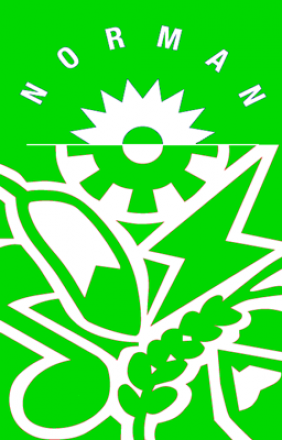Celebrate Love Your Lake Week at Habitat and All That from 9 AM to 1 PM on July 27, 2024 at The Well

Celebrate Love Your Lake Week with the City of Norman as we partner with groups like the Lake Thunderbird Watershed Alliance (LTWA) and the Oklahoma Conservation Commission to present Habitat and All That: Fish and Our Flying Friends on July 27, 2024, from 9 AM to 1 PM at The Well (210 James Garner, Norman, OK). Hands-on activities about birds, bees, butterflies, fish, and all of the amazing critters around us will educate and entertain participants! Stations will include rain-chain and fish-print making, seed bomb creation, live insects from the watershed, and much more!
Join us at The Well in the Exhibition Hall to celebrate and learn about our wonderful resources!
City of Norman Solar Arrays
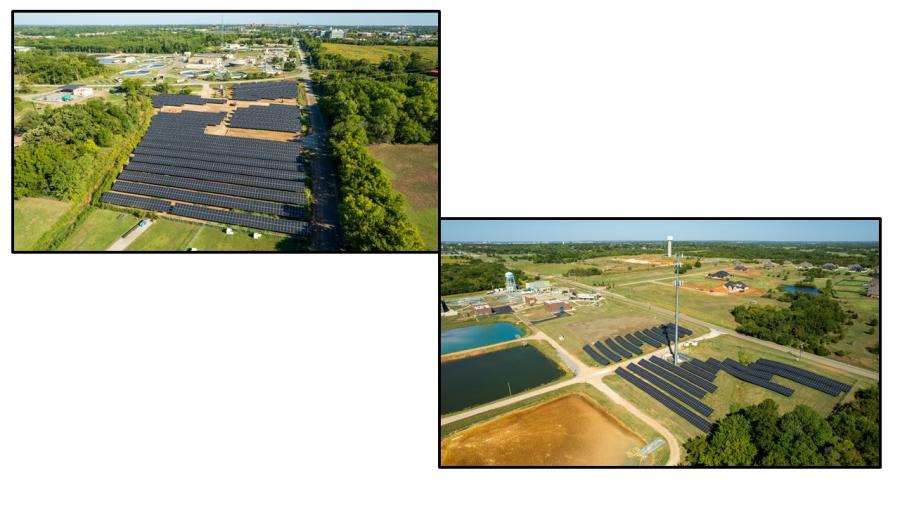
In Fall 2022, the Norman Utilities Authority worked with a solar contractor to install two large solar arrays. The 2.3 MW total installation is expected to offset 30% of the annual electrical needs for the next 25 years.
Follow the below links to view our current protections for each site:
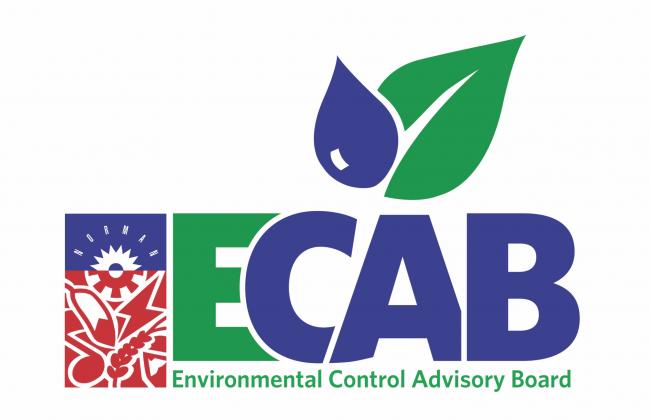
Environmental Control Advisory Board
- Investigates
- Prepares
- Plans
Resilience and Sustainability Educational Series
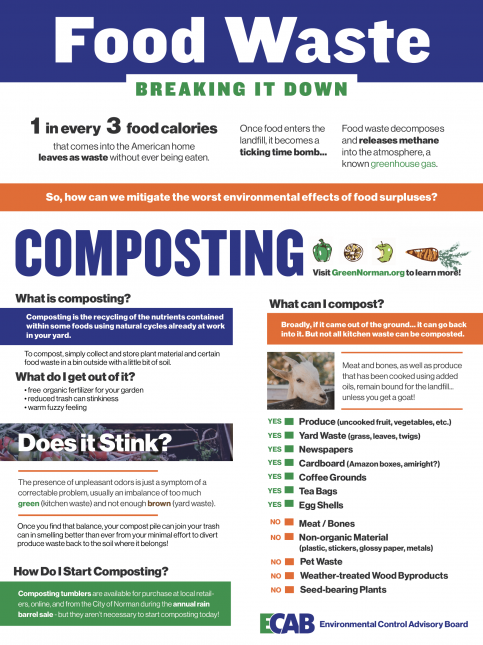
Upcoming Workshops:
Check back in the spring!
If you have ideas for future class topics, please send them to us! You can email us at EnvironmentalServices@normanok.gov or call us at 405-292-9731.
Mayor's Climate Protection Agreement
The City of Norman was the first city in Oklahoma to adopt the Mayor's Climate Protection Agreement. Check out the document, updates and recommendations here.
Water's Worth It™

Timely Topic of the Day

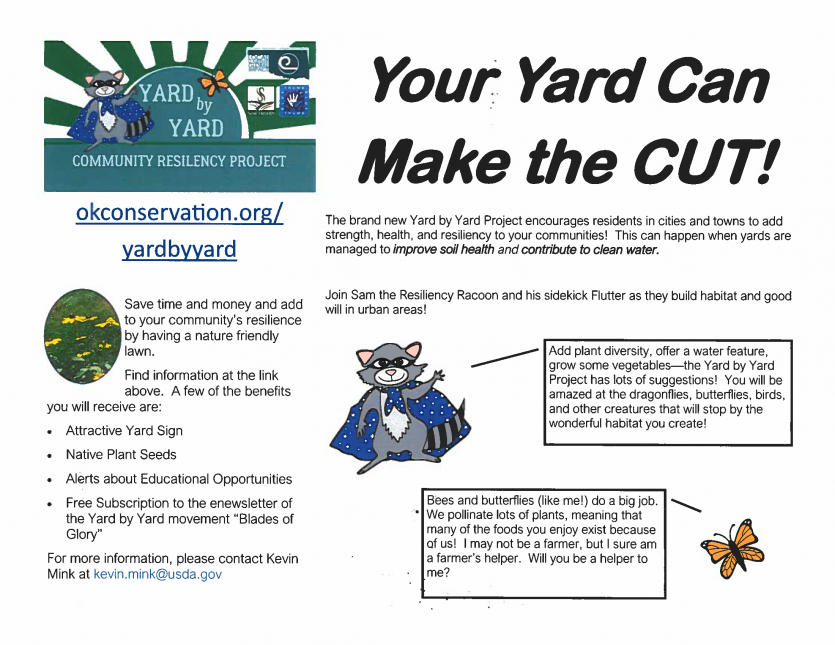
Tips for Conserving Water

EVERY DROP COUNTS!
HERE ARE SOME GREAT TIPS
FOR CONSERVING WATER!
Bathrooms:
Never use your toilet as a waste basket.
Do not let the water run while shaving or brushing teeth.
Take short showers instead of tub baths. Turn off the water flow while soaping or shampooing.
If you must use a tub, close the drain before turning on the water and fill the tub only half full. Bathe small children together.
Never pour water down the drain when there may be another use for it -such as watering a plant or garden.
Kitchen and Laundry:
Keep drinking water in the refrigerator instead of letting the faucet run until the water is cool.
Wash fruits and vegetables in a basin. Use a vegetable brush.
Do not use water to defrost frozen foods, thaw in the refrigerator overnight.
Use a dishpan for washing and rinsing dishes.
Scrape, rather than rinse, dishes before loading into the dishwasher.
Add food wastes to your compost pile instead of using the garbage disposal
Operate the dishwasher only when completely full.
Use the appropriate water level or load size selection on the washing machine.
Outside:
Sweep driveways, sidewalks and steps rather than hosing off.
Wash the car with water from a bucket, or consider using a commercial car wash that recycles water.
When using a hose, control the flow with an automatic shut-off nozzle.
Avoid purchasing recreational water toys that require a constant stream of water.
If you have a swimming pool, consider a new water-saving pool filter.
Lower pool water level to reduce amount of water splashed out.
Use a pool cover to reduce evaporation when pool is not being used
Equipment:
Repair all leaks. A leaky toilet can waste 200 gallons per day. To detect leaks in the toilet, add food coloring to the tank water. If the colored water appears in the bowl, the toilet is leaking. Toilet repair advice is available at www.toiletology.com/index.shtml.
Install ultra-low flow toilets, or place a plastic container filled with water or gravel in the tank of your conventional toilet. Be sure it does not interfere with operation of the toilet’s flush mechanism.
Install low-flow aerators and showerheads.
Consider purchasing a high efficiency washing machine which can save over 50% in water and energy use.
WATER EFFICIENCY MEASURES FOR LANDSCAPING
Watering:
Detect and repair all leaks in irrigation systems.
Use properly treated wastewater for irrigation where available.
Water the lawn or garden during the coolest part of the day (early morning is best). Do not water on windy days.
Water trees and shrubs, which have deep root systems, longer and less frequently than shallow-rooted plants which require smaller amounts of water more often. Check with the local extension service for advice on the amount and frequency of watering needed in your area.
Set sprinklers to water the lawn or garden only - not the street or sidewalk.
Use soaker hoses and trickle irrigation systems.
Install moisture sensors on sprinkler systems.
Planting:
Have your soil tested for nutrient content and add organic matter if needed. Good soil absorbs and retains water better.
Minimize turf areas and use native grasses.
Use native plants in your landscape - they require less care and water than ornamental varieties.
Maintaining:
Use mulch around shrubs and garden plants to reduce evaporation from the soil surface and cut down on weed growth.
Remove thatch and aerate turf to encourage movement of water to the root zone.
Raise your lawn mower cutting height - longer grass blades help shade each other, cut down on evaporation, and inhibit weed growth.
Minimize or eliminate fertilizing which requires additional watering, and promotes new growth which will also need additional watering.
Ornamental Water Features:
Do not install or use ornamental water features unless they recycle the water. Use signs to indicate that water is recycled. Do not operate during a drought.
FOAM - WHICH #6 ITEMS CAN BE RECYCLED?
WHY FOAM IS BAD FOR THE ENVIRONMENT...
"Expanded Polystyrene (EPS)," the #6 in the recycle triangle found on plastic containers, and named "Styrofoam" by its inventor, the Dow Chemical Corporation, is a known carcinogen if eaten, burned in incinerators, or left to leach into the soil by placing it in the landfill instead of being recycled. It will essentially remain, crushed, dirty and broken, 500 years from now; It doesn't decompose. The cup you drank your morning coffee from will remain in the environment "forever."
"Foam" wreaks havoc on the environment. One of the main concerns is that it's not biodegradable and therefore takes up a lot of space in landfills, which adds to the pollution problem. If littered, EPS foam sometimes breaks into smaller pieces that are more difficult to clean up. Another argument against EPS foam is that it's made from nonrenewable fossil fuels and synthetic chemicals, which can also contribute to pollution. EPS foam sometimes makes its way into waterways and can have disastrous effects on animals that may confuse it for food or nesting material.
In 2019, coalition of local churches called "Churches Caring for Creation," decided to work together to develop a program with the goal of safely recycling #6 plastic. This goal has spread to the public collection of foam in 6 central Oklahoma communities.
WHAT HAPPENS TO FOAM AFTER IT'S COLLECTED?
The foam logs are placed on pallets and stored under a protective cover because plastic deteriorates when exposed to light. (Think about plastic outdoor furniture left out in the sun.)
A major national plastics recycler has expressed interest in securing our densified logs. They will sell and transport the foam to manufacturers who make new items from recycled foam. Some of these items include picture frames, crown molding and decorative trim for ships, motor homes and airplanes in which keeping weight to a minimum is beneficial.
It’s more economical to make new foam items from recycled foam than using virgin chemicals. Any proceeds of this sale will be returned to the foam densifying program to pay for equipment, gasoline, and densifying supplies.
WHERE CAN I RECYCLE FOAM WEEKDAYS?
A "Styro-Station" where foam can be dropped off for safe recycling is located at:
University Lutheran Church & Student Center
914 Elm (1ST block south of Lindsey)
*Styro-Station is easily accessed off the church parking lot located on College, behind the church.
Hours: Mon. - Fri. 9 a.m. to 5 p.m. A drop-off box is placed outside the door if the office is closed.
Items to recycle include foodservice containers and packaging foam, but no packaging peanuts. Because all foam must be "clean,Clean, CLEAN" to densify into
solid plastic logs, all items brought to recycle must be grease-free, food and drink-free, and have tape and paper labels removed.
++ Please bring egg cartons WHOLE as they are recycled to a family poultry farmer in Seminole, OK.
WHERE ELSE CAN I RECYCLE FOAM?
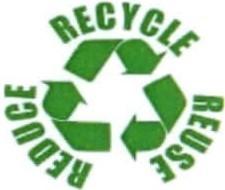
Public Libraries in several Central Oklahoma towns are hosting collection/densifying events in 2022. Additional dates will be added as they are scheduled.
(Saturdays from 10 - Noon unless noted otherwise.)
06/04 – Noble Public Library 06/25 – Shawnee Public Library
07/09 – Norman Public Library (Central) 08/06 – Moore Public Library
08/13 – Norman (HHWF) 08/27 – Noble Public Library
09/10 – Newcastle Public Library 10 – Noon
Blanchard Public Library 1:30 – 3:30 p.m.
09/17 – Shawnee Public Library 10/22 – Norman Public Library
11/12 – Norman (HHWF)
1/7/23 – Shawnee Public Library
PRINTABLE PDF FOAM FLYER
FOAM Q&A
E-WASTE
There is an ever-growing need for proper disposal of electronics, and there are not many avenues for residents to do this in an environmentally sound way.
The City of Norman holds two discrete events every year to help with the prevention, control, and abatement of pollution caused by solid waste. One in the Spring and one in the Fall.
Big Event
The Big Event is the University of Oklahoma's official day of community service! Volunteers participate in this event to show their appreciation to the surrounding community by completing service projects such as painting, yard work, and visiting with the elderly.
Other services projects completed in years past include but are not limited to:
- Distribution of door hangers
- Distribution of recycling stickers
- Park clean ups
- Community clean ups
Pollinator Week
June 20th - June 26th
National Pollinator Week is a national initiative that offers opportunities to individuals and communities to help restore native habitat, support local pollinator species and the City of Norman will continue to support local, state, and national efforts that protect, restore, and conserve habitat for pollinators, as well as foster a greater connection between residents and wildlife.
The City of Norman is home to many native wildlife and pollinator species such as birds, bees, and insects which keep our environment healthy and biodiverse and the City of Norman recognizes that human health ultimately depends on well-functioning ecosystems and that biodiverse regions can better support food production, healthy soil and air quality and can foster healthy connections between humans and wildlife.
The City of Norman is working to build a healthy, sustainable and wildlife-friendly community that brings the many benefits of nature to all corners of our community.
Pollinators play an important role in maintaining a healthy ecosystem and in urban communities, pollinators play a crucial role in maintaining sustainable urban agriculture, local community gardens, and residential landscaping. Pollinator species are in decline due to habitat loss and the use of pesticides, causing many species to decline significantly in the past 25 years
Earth Day & Green Norman Eco Month
Senator Gaylord Nelson created Earth Day to increase environmental awareness and to highlight devastating effects of pollution to our air, water, and soil to the nation; twenty-two (22) million Americans celebrated the first Earth Day on April 22, 1970. Today, Earth Day is recognized as the largest secular observance in the world and celebrated by more than a billion people as a day of action to change human behavior and continue the fight for a clean and healthy environment! We encourage our citizens to make a difference in our community: to think, reduce, reuse, recycle, replenish, restore, refresh, replant, rebuild, repurpose and respect.
- The City of Norman Parks and Recreation, Utilities, and Public Works Departments, in conjunction with community groups across the city, including the Norman Public Library, Cleveland County Master Gardeners, Oklahoma Water Survey, Lake Thunderbird State Park, and others, get together and plan a series of events to celebrate this important milestone.
- March 28th - May 1st, is recognized as Green Norman EcoMonth with free activities and education seminars to he held at various locations across the city.
Associations & Outside Agencies
- American Public Works Association
- COMCD Project
- Earth Month
- Greenovation
- Hazardous Waste Management Advisory
- Institutional Biosafety Committee
- Keep Oklahoma Beautiful
- Nonprofit Tool Box Series
- Oklahoma Department of Environmental Quality
- Oklahoma Compost Conference
- Oklahoma Conservation Commission
- Oklahoma Municipal League
- Oklahoma Water Environment Association
- Oklahoma Water & Pollution Control Association
- Product Stewardship Institute
- READY FOR 100
- South West American Water Works Association
City Hall EV Charging Stations
Coming soon: Installation of two new high-capacity electric vehicle charging stations in the parking lot at City Hall located on the northwest corner of Gray Street and Santa Fe Avenue.
- This will allow citizens and visitors utilizing this parking lot to charge their vehicles as they engage in civic activity, conduct business with City departments, visit the post office, and perform other activities.
Bees
Click the link to view the Norman Transcript Article: Flight of the honeybees
ALL THINGS ENVIRONMENTAL
E-WASTE
There is an ever-growing need for proper disposal of electronics, and there are not many avenues for residents to do this in an environmentally sound way.
The City of Norman holds two discrete events every year to help with the prevention, control, and abatement of pollution caused by solid waste. One in the Spring and one in the Fall.
Big Event
The Big Event is the University of Oklahoma's official day of community service! Volunteers participate in this event to show their appreciation to the surrounding community by completing service projects such as painting, yard work, and visiting with the elderly.
Other services projects completed in years past include but are not limited to:
- Distribution of door hangers
- Distribution of recycling stickers
- Park clean ups
- Community clean ups
Pollinator Week
June 20th - June 26th
National Pollinator Week is a national initiative that offers opportunities to individuals and communities to help restore native habitat, support local pollinator species and the City of Norman will continue to support local, state, and national efforts that protect, restore, and conserve habitat for pollinators, as well as foster a greater connection between residents and wildlife.
The City of Norman is home to many native wildlife and pollinator species such as birds, bees, and insects which keep our environment healthy and biodiverse and the City of Norman recognizes that human health ultimately depends on well-functioning ecosystems and that biodiverse regions can better support food production, healthy soil and air quality and can foster healthy connections between humans and wildlife.
The City of Norman is working to build a healthy, sustainable and wildlife-friendly community that brings the many benefits of nature to all corners of our community.
Pollinators play an important role in maintaining a healthy ecosystem and in urban communities, pollinators play a crucial role in maintaining sustainable urban agriculture, local community gardens, and residential landscaping. Pollinator species are in decline due to habitat loss and the use of pesticides, causing many species to decline significantly in the past 25 years
Earth Day & Green Norman Eco Month
Senator Gaylord Nelson created Earth Day to increase environmental awareness and to highlight devastating effects of pollution to our air, water, and soil to the nation; twenty-two (22) million Americans celebrated the first Earth Day on April 22, 1970. Today, Earth Day is recognized as the largest secular observance in the world and celebrated by more than a billion people as a day of action to change human behavior and continue the fight for a clean and healthy environment! We encourage our citizens to make a difference in our community: to think, reduce, reuse, recycle, replenish, restore, refresh, replant, rebuild, repurpose and respect.
- The City of Norman Parks and Recreation, Utilities, and Public Works Departments, in conjunction with community groups across the city, including the Norman Public Library, Cleveland County Master Gardeners, Oklahoma Water Survey, Lake Thunderbird State Park, and others, get together and plan a series of events to celebrate this important milestone.
- March 28th - May 1st, is recognized as Green Norman EcoMonth with free activities and education seminars to he held at various locations across the city.
Associations & Outside Agencies
- American Public Works Association
- COMCD Project
- Earth Month
- Greenovation
- Hazardous Waste Management Advisory
- Institutional Biosafety Committee
- Keep Oklahoma Beautiful
- Nonprofit Tool Box Series
- Oklahoma Department of Environmental Quality
- Oklahoma Compost Conference
- Oklahoma Conservation Commission
- Oklahoma Municipal League
- Oklahoma Water Environment Association
- Oklahoma Water & Pollution Control Association
- Product Stewardship Institute
- READY FOR 100
- South West American Water Works Association
City Hall EV Charging Stations
Coming soon: Installation of two new high-capacity electric vehicle charging stations in the parking lot at City Hall located on the northwest corner of Gray Street and Santa Fe Avenue.
- This will allow citizens and visitors utilizing this parking lot to charge their vehicles as they engage in civic activity, conduct business with City departments, visit the post office, and perform other activities.
Bees
Click the link to view the Norman Transcript Article: Flight of the honeybees


